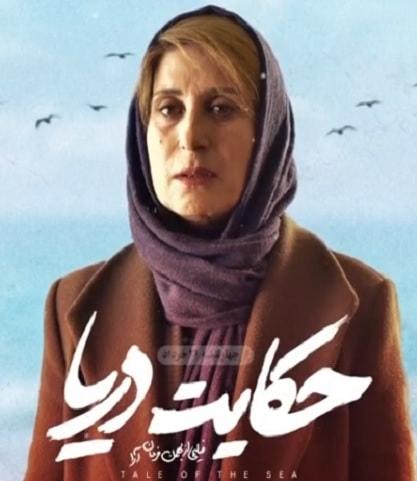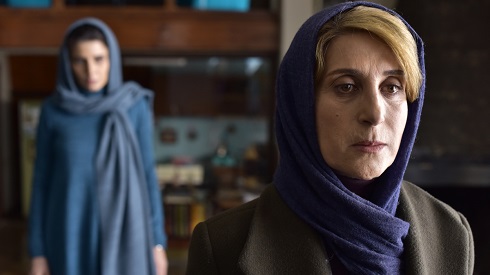|
|

|
TALE OF THE SEA | Hekayat-e Darya (2018)
Directed by: Bahman Farmanara
Date of birth: 23 January 1942, Teheran, Iran
Writing credits:
Bahman Farmanara
Music:
Peyman Yazdanian
Country: Iran
Language: Farsi
Color: Color
Runtime: 97 minutes
Released: 2018
Genre:
Drama
|
|
TALE OF THE SEA • Film Review
An Ingmar Bergman-esque meditation on old age
By Deborah Young, Hollywood Reporter
5/2/2018
The Iranian filmmaker's most personal and touching film to date. -- Deborah Young, Hollywood Reporter
One of Iran's major filmmakers is at the top of his game with this Ingmar Bergman-esque meditation on old age. -- Harvey S. Karten, Big Apple Reviews
Where I come from, metaphors have replaced reality. The story of Taher Mohebi and his descent into madness is the only way I could tell the story I wanted to tell. One man’s madness is a metaphor for the surreal lives of a whole nation. -- Bahman Farmanara
Director Bahman Farmanara plays a writer who has lost his nerve in a drama co-starring Fatemeh Motamed-Arya and Leila Hatami.
Tale of the Sea (Hekayat-e Darya) is Bahman Farmanara’s resonant elegy to the conclusion of an artistic era and his salute to a generation of Iranian writers, artists, musicians and filmmakers who are leaving the scene. Abbas Kiarostami, who died just over a year ago, is the name most international viewers will recognize, but many more are mentioned in this simple, atmospheric tale.
It is the writer-director-producer’s most personal film since Smell of Camphor, Fragance of Jasmine and has the same kind of melancholy wistfulness. A starry cast including Fatemeh Motamed-Arya (Gilane, Men at Work), Leila Hatami (A Separation) and Ali Mosaffa (The Past) should help this quiet work from Dream Labs find appreciative upscale audiences. It was screened at the Fajr film market.

Happily, the runaway symbolism of some of the director’s earlier films is considerably toned down here, leaving room for an emotional response to the characters. The utterly simple, unpretentious shooting style fits well with the equally straightforward story, foregrounding key relationships in the writer’s circle. Of course, there is ample room to read in references to and commentary on contemporary Iran.
The stately cast is lead by Farmanara himself in the role of Taher Mohebi, an ailing writer who has spent three years in a mental institution teetering on the edge of schizophrenia. Now his doctor (Mosaffa) is ready to release him into the care of his wife Jaleh (Motamed Arya), but is dismayed to hear her announce she intends to file for divorce. Apparently his depression makes him unbearable to live with. But on the doctor’s advice, she puts off telling Taher she’s leaving him and they settle uneasily into their airy house by the sea.

(Courtesy of Dream Lab Films)
Puttering around his office on a new book, Taher is a lumbering Harold Bloom figure who insulates himself from the world with books and music and who quaintly writes on a manual typewriter. He calls old age a “prostate party” and casts a cold eye on the world, but has a warm heart for Jaleh and those who come to him in need. More than a bona fide character, he seems like the gentle, witty screen transposition of the filmmaker himself.
On his long walks on the beach and in nearby parks, Taher encounters figures from his past like a desperate young political activist (Saber Abar, About Elly) who was once his student, and a supportive elderly friend (veteran Ali Nassirian) who turns out to have been “assigned to eternity” many years ago. He is a hallucination, but a comforting one.

There is much that is theatrical in the screenplay, especially noticeable in the sharp, pointed dialogue. Making her unexpected entrance as in a play, Parvaneh (Hatami) turns up announced from abroad and informs Taher she is his daughter. Her mother, his secret lover, didn’t tell him she was pregnant when she left Iran, and the girl only found out recently who her father is. He invites her to stay with them for a week or two, which is the last straw for the childless Jaleh, played with great dignity and intelligence by Motamed-Arya.
The third-act drama feels unreal and tacked on with the obvious intent of forcing Taher back into the world.

veteran Ali Nassirian with Bahman Farmanara
Peyman Yazdanian’s score is dominant in creating the film’s mournful tone, echoing Keyvan Moghadam’s dreamy sets and DP Farshad Mohamadi’s fog-shrouded seascapes where Taher evades reality.
*****
Log line:
Where I come from, metaphors have replaced reality. The story of Taher Mohebi and his descent into madness is the only way I could tell the story I wanted to tell. One man’s madness is a metaphor for the surreal lives of a whole nation.
Synopsis:
Taher Mohebi is a well-known writer who, after witnessing a violent murder, breaks down and spends three years in a mental institution. After release he is told that things are just as they were before, but his relentless hallucinations make him want to return to the institution.
Director’s statement:
When it is forbidden to tell one’s story in an open manner because of its political implications, one is obliged to use metaphors to communicate with one’s audience. Tale of The Sea is the story of a well-known writer, driven to madness because of a tragic incident he witnessed. His personal story, with his wife and the daughter of his former lover, gives a twist to a tale that is as complicated as the sea, for the sea only tells the truth when a storm is raging.
*****
Tale of The Sea
Original title: Hekayat-e Darya
International title: Tale of The Sea
Type: Fiction
Production company: Iris Films
Cast: Bahman Farmanara, Fatemeh Motamed-Arya, Leila Hatami, Saber Abar, Ali Nassirian, Roya Nonahali, Ali Mosaffa, Pantea Panahiha
Director, screenwriter, producer: Bahman Farmanara
Director of photography: Farshad Mohamadi
Production designer: Keyvan Moghadam
Costume designer: Sarah Samiei
Editor: Abbas Ganjavi
Music: Peyman Yazdanian
World sales: DreamLab Films
Venue: Fajr Film Festival (Film Market)
97 minutes
|
More films created by Bahman Farmanara
- TALE OF THE SEA | Hekayat-e Darya (2018)
- Earthbound | Khak-Ashna (2008)
- A Little Kiss - Yek Boos-e Koochooloo (2005)
- A House Built On Water | Khanei ruye ab (2002)
- Smell of Camphor, Fragrance of Jasmine | Booye Kafoor, Atre Yas (2000)
- Sayehaye bolande bad | Tall Shadows Of The Wind (1979)
- Prince Ehtejab | Shazdeh Ehtejab (1974)
- The House Of Qamar Khanoum | Khaneye Ghamar khanoum (1972)
|
| Choose an item to go there!
|
|

